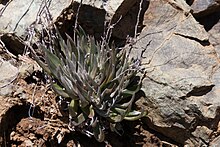| Dudleya abramsii subsp. setchellii | |
|---|---|

| |
| Conservation status | |
 Endangered (ESA) | |
| Scientific classification | |
| Kingdom: | Plantae |
| Clade: | Tracheophytes |
| Clade: | Angiosperms |
| Clade: | Eudicots |
| Order: | Saxifragales |
| Family: | Crassulaceae |
| Genus: | Dudleya |
| Species: | D. abramsii |
| Subspecies: | D. a. subsp. setchellii |
| Trinomial name | |
| Dudleya abramsii subsp. setchellii (Jeps.) Moran | |
| Synonyms | |
| |
Dudleya abramsii subsp. setchellii, known by common name as the Santa Clara Valley dudleya or Santa Clara Valley liveforever, is a member of the Dudleya genus of succulent perennials, members of the family Crassulaceae. The Santa Clara Valley dudleya, endemic to the Santa Clara Valley region in the southern San Francisco Bay Area, was listed on 3 February 1995, as an endangered species. It is considered to be a subspecies of Dudleya abramsii, but its taxonomic status is still unclear. Its closest relative is Dudleya cymosa subsp. paniculata, which is a morphologically similar sister taxon.
Description
A perennial rosette-forming succulent, this species is characterized by pale yellow petals, a simple (not branching multiple times) inflorescence, and a restriction to serpentine soil.
Morphology
This rosettes are anywhere from 2–9 cm (0.79–3.54 in) wide, on top of stems (also referred to as caudices) that are 10–20 mm (0.39–0.79 in) wide. The stems may branch dichotomously to form 1 to 5 rosettes. The leaves are shaped oblong-triangular to lance-elliptic to lanceolate, and have a glaucous surface. The leaves measure 3–8 cm (1.2–3.1 in) long by 7–15 mm (0.28–0.59 in) wide.
The peduncle is 5–20 cm (2.0–7.9 in) tall and 2–4 mm (0.079–0.157 in) wide. The lower bracts on the peduncle measure 10–25 mm (0.39–0.98 in) long. There are typically 2 to 3 first degree branches on the inflorescence, which are oriented in an ascending fashion and usually do not bifurcate further. On the branches are pedicels, measuring 2–7 mm (0.079–0.276 in) in length, holding the flowers. The flowers have sepals that are 2–5 mm (0.079–0.197 in) long, and shaped deltate. The petals are 8–13 mm (0.31–0.51 in) long by 2.5–3.5 mm (0.098–0.138 in) wide, and shaped elliptic, with their tips acute. The lower parts of the petals are fused 1–2.5 mm (0.039–0.098 in) the way up to form a tube. The petals are colored a pale yellow.
Taxonomy
| Cladogram of Dudleya setchellii | |||||||||||||||
|
Dudleya abramsii subsp. setchellii has undergone numerous changes in its taxonomic classification. Originally placed a subspecies of Cotyledon laxa / Echeveria laxa, an antiquated synonym for Dudleya caespitosa, botanists Nathaniel Lord Britton and Joseph Nelson Rose placed it as a separate species within Dudleya in 1903. In a 1957 issue of Madroño, botanist Reid Moran revised setchellii as a subspecies of Dudleya cymosa. Cotyledon caespitosa var. paniculata, now Dudleya cymosa subsp. paniculata, was merged into setchellii. Almost half a century later, Moran and other botanists returned to setchellii, and again revised it as a subspecies of Dudleya abramsii.
It is visually similar to and sometimes indistinguishable from Dudleya cymosa subsp. paniculata. Recent phylogenetic analysis may in fact place setchellii back into a subspecies of D. cymosa, as it is most closely related to D. c. subsp. paniculata. Reid Moran, who combined it back into D. abramsii, suggests that it owes a superficial resemblance to Dudleya abramsii subsp. murina.

Distribution
Dudleya abramsii subsp. setchellii is found only in the Coyote Valley area of southern Santa Clara County, California, mostly on rocky outcrops within serpentine grasslands on Tulare Hill and the Santa Teresa Hills west of Coyote Creek in south San Jose and south of Metcalf Canyon east of Coyote Creek.
Gallery
-
 Detail of the flowers and inflorescence in bloom
Detail of the flowers and inflorescence in bloom
-
 Detail of the flowers and inflorescence in bloom
Detail of the flowers and inflorescence in bloom
-
 Detail of the flowers and inflorescence in bloom
Detail of the flowers and inflorescence in bloom
-
 Growing in habitat
Growing in habitat
-
 Plants in habitat
Plants in habitat
See also
References
- ^ "Dudleya abramsii ssp. setchellii". Calflora. Berkeley, California: The Calflora Database. 2021. Archived from the original on 17 April 2021. Retrieved 23 August 2021.
- The Plant List, retrieved 9 July 2016
- ^ Moran, Reid (2007). "Dudleya abramsii Rose subsp. setchellii (Jeps.) Moran, comb. nov". Journal of the Botanical Research Institute of Texas. 1 (2): 1015.
- ^ Yost, J. M.; Bontrager, M.; McCabe, S. W.; Burton, D.; Simpson, M. G.; Kay, K. M.; Ritter, M. (2013). "Phylogenetic relationships and evolution in Dudleya (Crassulaceae)" (PDF). Systematic Botany. 38 (4): 1096–1104. doi:10.1600/036364413X674760. S2CID 15715233.
- "Dudleya key to species". Jepson eFlora. Jepson Flora Project. Retrieved 8 May 2022.
- ^ McCabe, Stephen Ward (2012). "Dudleya abramsii subsp. setchellii". Jepson eFlora. Jepson Flora Project (eds.). Archived from the original on 30 August 2016. Retrieved 23 August 2021.
- ^ Moran, Reid. "Dudleya abramsii subsp. setchellii". In Flora of North America Editorial Committee (ed.). Flora of North America North of Mexico (FNA). New York and Oxford: Oxford University Press. Retrieved 7 May 2022 – via eFloras.org, Missouri Botanical Garden, St. Louis, MO & Harvard University Herbaria, Cambridge, MA.
- Jepson, Willis Linn (1901). "Cotyledon laxa var. setchellii". Flora of Western Middle California: 267 – via crassulaceae.com.
- Jepson, Willis Linn (1936). "Echeveria laxa var. setchellii". Flora of California. 2: 114.
- Britton, Nathaniel Lord; Rose, Joseph Nelson (1903). "Dudleya setchellii". Bulletin of the New York Botanical Garden. 3 (9): 15.
- Moran, Reid (1957). "Dudleya cymosa ssp. setchellii". Madroño. 14 (3): 108.
- ^ Nakai, K. M. (1987). "SOME NEW AND RECONSIDERED CALIFORNIA DUDLEYA (CRASSULACEAE)". Madroño. 34 (4): 338.
External links
- Jepson Manual Treatment – Dudleya setchellii
- USDA Plants Profile: Dudleya setchellii
- Dudleya setchellii – Photo gallery
| Taxon identifiers | |
|---|---|
| Dudleya setchellii | |